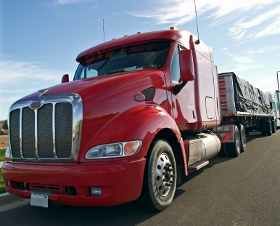Working At Schneider National
Topic 2654 | Page 1
Welcome aboard Big H! Thanks a ton for sharing that with us!
they want you to follow the GPS route to be most economic. I don't get it! lots of time it takes you through single lane highways so you will be shifting, going up and down, accelerating, slowing down etc... versus going through the interstate which saves them fuel.
I would talk around a bit to other drivers about this. Obviously saving fuel is extremely important because it's a huge expense. But you're right - you're often going to waste time and fuel running through narrow mountain roads instead of cruising on Interstates. A lot of times companies set policies that really don't make sense or they're only designed to "do the thinking for you" if you're a new driver. They don't want to overwhelm people with options or give them too much wiggle room to make a bad decisions so they tell you how to handle certain situations.
I suspect that Schneider isn't going to say anything or even notice if you take the Interstate instead of back roads when taking the Interstate makes more sense. Talk around and see what the more experienced drivers are doing in these situations. I think they'll probably tell you they just run the route that makes the most sense.
Interstate:
Commercial trade, business, movement of goods or money, or transportation from one state to another, regulated by the Federal Department Of Transportation (DOT).
OWI:
Operating While Intoxicated

My pleasure! That's actually a good idea. I will get with the experienced drivers to see how they deal with that. Thank you!

Learned anything about their oilfield jobs? May look into that after my year with prime so long as its in Texas.

Not really but I met a guy he worked at the bulk division and he was happy with it! they always hire tankers in Houston area check out their career section you will find some tankers position with sign on bonuses in Texas!
I take the route that makes the most sense to me, after checking to be sure that a) the total miles are similar to what they say it should be, b) the major roads are the same, c) I'm not going on a toll road that they don't want to pay for, such as the PA pike, and d) they haven't specified a way point that I'm not hitting. It is those rare occasions when they give a waypoint that the route that the nav unit will choose is often much different, in my experience. Routes following their waypoint are often perplexing, but they've got a reason that they chose them, whatever it is, and they're paying for the fuel and miles on the truck, so....
Welcome aboard Big H! Thanks a ton for sharing that with us!
they want you to follow the GPS route to be most economic. I don't get it! lots of time it takes you through single lane highways so you will be shifting, going up and down, accelerating, slowing down etc... versus going through the interstate which saves them fuel.
I would talk around a bit to other drivers about this. Obviously saving fuel is extremely important because it's a huge expense. But you're right - you're often going to waste time and fuel running through narrow mountain roads instead of cruising on Interstates. A lot of times companies set policies that really don't make sense or they're only designed to "do the thinking for you" if you're a new driver. They don't want to overwhelm people with options or give them too much wiggle room to make a bad decisions so they tell you how to handle certain situations.
I suspect that Schneider isn't going to say anything or even notice if you take the Interstate instead of back roads when taking the Interstate makes more sense. Talk around and see what the more experienced drivers are doing in these situations. I think they'll probably tell you they just run the route that makes the most sense.
Interstate:
Commercial trade, business, movement of goods or money, or transportation from one state to another, regulated by the Federal Department Of Transportation (DOT).
HOS:
Hours Of Service
HOS refers to the logbook hours of service regulations.OWI:
Operating While Intoxicated
OOS:
When a violation by either a driver or company is confirmed, an out-of-service order removes either the driver or the vehicle from the roadway until the violation is corrected.
I take the route that makes the most sense to me, after checking to be sure that a) the total miles are similar to what they say it should be, b) the major roads are the same, c) I'm not going on a toll road that they don't want to pay for, such as the PA pike, and d) they haven't specified a way point that I'm not hitting. It is those rare occasions when they give a waypoint that the route that the nav unit will choose is often much different, in my experience. Routes following their waypoint are often perplexing, but they've got a reason that they chose them, whatever it is, and they're paying for the fuel and miles on the truck, so....
They have to pay for the Penna turnpike, how else would we be able to get to the Carlisle OC from OH?
Mainly, from what I've experienced, they try and reduce the miles and toll costs as much as possible. They never route me on 80 through Indiana/western Ohio, but rather on, what is that, US-20 that runs parallel to 80. I take the toll road anyway as it's more direct and saves time. Same thing with the NY Thruway.
The other day (sunday) I had a load going from York PA to Uxbridge MA. Jill wanted me to go across 78 and up 287 to the tappen zee over to 95. I said no, I went up 87 up to Scranton and across 84 through Hartford. It may have added a little bit more miles, but it was extremely less stressful and far less hazardous than dealing with the east coast craziness.
HOS:
Hours Of Service
HOS refers to the logbook hours of service regulations.OWI:
Operating While Intoxicated
OOS:
When a violation by either a driver or company is confirmed, an out-of-service order removes either the driver or the vehicle from the roadway until the violation is corrected.
They have to pay for the Penna turnpike, how else would we be able to get to the Carlisle OC from OH?
Well, it depends upon where you are in Ohio - it's a big state :-)
Many companies avoid the PA pike when possible, because it is very expensive for trucks.
I've driven all sorts of places to and through PA this year and have not been on the pike yet.
New Reply:
New! Check out our help videos for a better understanding of our forum features

















Preview:
This topic has the following tags:
Schneider National







 TT On Facebook
TT On Facebook
Brett, Thank you so much for creating this website. a few months back before I get into trucking industry I got lots of useful information from this website thanks again! Not sure if this is the right section to post this but I thought I put this out there for rookies like myself lol! I started with Schneider National in the mid Dec-2013 here in Indianapolis. They have 3 weeks of training. the first week is all about the log books, signing papers and benefits, driving around town and backing practices. second week they send you out with a trainer on the road(I think one week is not enough for that in my opinion 2 weeks will be better). and third week is learning the Qualcomm , trip planing and the SQT(student qualification test) which is pretty simple but at first they make it sound like a very important test but it's not! after that they assign you a truck at first it was really hard and overwhelming to remember all those things they taught me in class but eventually I started to learn on my own day after day out there.
Cons are: they are very strict on idling temp has to be 10 degrees before you can idle the truck for the night (which is absurd because the bunk heater does not really keep you warm!). they want you to follow the GPS route to be most economic. I don't get it! lots of time it takes you through single lane highways so you will be shifting, going up and down, accelerating, slowing down etc... versus going through the interstate which saves them fuel. Their trucks are governed at 60mph literally every truck passes you on the road except for Prime haha! They take every thing so serious and strict. every time I'm at one of their terminals I feel like I'm in area 51 or the Pentagon!
Pros are: They keep you busy they give you the miles constantly, you can get anywhere between 2000 to 2600 miles per week it all depends on you and how good you are to run those miles. The training pay is $85 a day. once you get your truck they start you out at 30 cents a mile and you get 2 cents raise every 3 months up to 36 cents a mile within one year being with them. So far they're all friendly never had issues with them. They offer $150 flat rate monthly for tuition reimbursement. Most positions has sign on bonus up to $3000 for students and up to $6000 for experienced drivers. As an OTR driver for every 2 weeks out I get 3 days off. the longer you stay more days off you get. they're flexible with your home time. It's a good company to start out with. gain experience for 6 months or maybe a year at the most then runaway to a much smaller company ha!
Terminal:
A facility where trucking companies operate out of, or their "home base" if you will. A lot of major companies have multiple terminals around the country which usually consist of the main office building, a drop lot for trailers, and sometimes a repair shop and wash facilities.
OTR:
Over The Road
OTR driving normally means you'll be hauling freight to various customers throughout your company's hauling region. It often entails being gone from home for two to three weeks at a time.
Qualcomm:
Omnitracs (a.k.a. Qualcomm) is a satellite-based messaging system with built-in GPS capabilities built by Qualcomm. It has a small computer screen and keyboard and is tied into the truck’s computer. It allows trucking companies to track where the driver is at, monitor the truck, and send and receive messages with the driver – similar to email.Interstate:
Commercial trade, business, movement of goods or money, or transportation from one state to another, regulated by the Federal Department Of Transportation (DOT).
HOS:
Hours Of Service
HOS refers to the logbook hours of service regulations.OWI:
Operating While Intoxicated